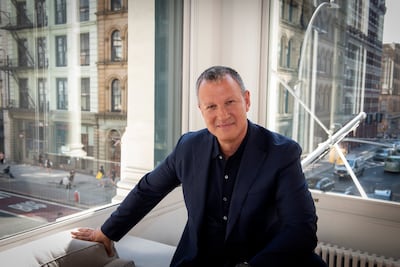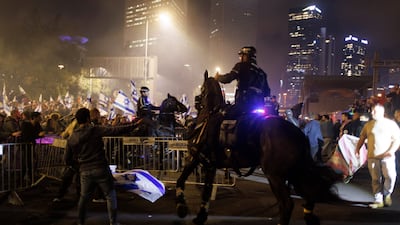Prime Minister Benjamin Netanyahu’s plan to drastically limit the power of Israel’s judiciary has sparked the biggest protest movement in the country’s history.
Following the sacking of defence minister Yoav Gallant on Sunday after he urged Mr Netanyahu to pause the reforms, demonstrators are planning mass industrial action, holding hunger strikes outside Mr Netanyahu’s Jerusalem residence and blocking access to the country’s airport, forcing authorities to stop all departing flights.
The National spoke to Israelis across society about why they have been turning out week after week, and why public anger is escalating so quickly.
venture capitalist
Anne from the northern city of Netanya, who leads an assembly of hundreds of protesting grandmothers, said her diverse group had “come together out of shared concern for the future of our grandchildren”.
“You reach a certain age, especially when you're a woman, when you tend to become invisible. Old ladies with white hair are kind of passed by and ignored. No one thinks they have any energy left. But at least 1,500 grandmothers demonstrating as we just did, some with walking sticks, shows that that’s simply not true,” she told The National.
“The response to our protest has been overwhelmingly supportive. I don’t know of a single instance of people being rude. When young people saw us coming they stopped whatever they were doing and stood at the side of the road and waved and clapped us on.”
Competing visions of Israel
Erel Margalit, one of Israel’s leading venture capitalists and a former politician, said the country belonged to the people.
“We don’t think the country belongs to the extreme right," he told The National.
“In the last 25 or 30 years we built a very active, tech-heavy and vibrant economy which is completely different to the older economy."
Mr Margalit, whose venture capital company sees first hand market jitters over the reforms, fears this legacy is under threat.
“The struggle will be harsher before it gets resolved. I don’t think it will break Israeli society, but I do think that sometimes in the history of the making of the nation of Israel, a fundamental debate is needed to define not only the character of the country, but also something more fundamental within the Jewish people worldwide. Do we want to be closed off? Do we want to be extremists? Or do we want Israel and the Jewish people to be open, creative and collaborative?”
He is worried that the government is damaging regional openness.
“The breakthrough of the Abraham Accords put Israel in a new chapter,” he said.
“With our companies now in countries such as the UAE, Bahrain and Morocco, we can reach countries such as Saudi Arabia, Pakistan and Malaysia to an unprecedented extent today.”
The tech and start-up community, which Mr Margalit represents internationally on a daily basis, is one of the groups most starkly opposed to Mr Netanyahu’s reforms, which critics say could undermine the economy and end Israeli democracy.
But not all sectors of society are as united.
Mahmoud, an Israeli Arab who runs a cafe in Jerusalem, thought that it is “incredibly important” that his community engages with the protests to oppose the reforms.
“We live here, too,” he said.
His colleagues, also Israeli-Arabs, disagreed. “I view these protests as nothing more than children crying,” one said.
And while some are finding hope in the hundreds of thousands of Israelis turning out to voice their opposition, none are forgetting how grave today’s political crisis really is.
“I remember [Yitzhak] Rabin’s assassination as a very dark time,” Anne said.
“I felt tremendous polarisation in the country. That’s probably the only time that feels as dark as this,” she added.
"The wars Israel has had since I’ve been here have all been awful, but somehow people come together during them, whereas now there are these two fractured camps that are awful to witness.”

But she still feels hope that her coalition of grandmas can bring an important voice to Israel’s bitter national debate.
“Young people, especially young men, are very often hotheaded, and their answer to things is to push and shove and shout. That’s not the answer of a group of grandmas.
Our message is more to those who are educating those young men. To teach them tolerance, and ask them to step back and talk to people who don’t share their views.”
With Mr Netanyahu’s coalition under the highest levels of strain since its rise to power at the beginning of the year, Israel will need all the historical and contemporary strength it can find to guide it through arguably one of its darkest hours.


